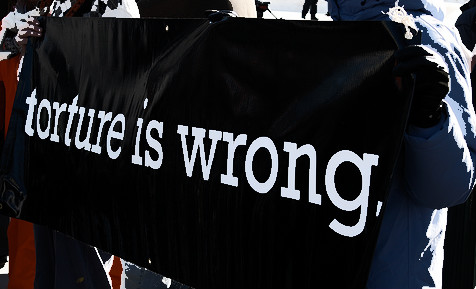Senate Torture Report: Deception, Outrage, Nothing
BY NICK SAWICKI |
January 7, 2014
It was a blistering September night in Oklahoma City. Then-Democratic presidential nominee Alfred E. Smith took the stage. Just hours before, as he had crossed into Oklahoma, Smith was greeted with burning crosses and anti-Catholic press promulgated by the Ku Klux Klan. The 1928 presidential race was the first to have a Catholic candidate for one of the major parties, and Smith and the Democratic Party had expected some resistance. However, Smith was not prepared in the least for the endless attacks on both his personal character and that of the Catholic Church. On that stage in Oklahoma City, his anger had reached its boiling point; he promised to “drag out into the open what has been whispered to you.” “The best way to kill anything un-American,” intoned Smith, “is to drag it out into the open, because anything un-American cannot live in the sunlight.”
On December 9, 2014, the United States Senate Select Committee on Intelligence released a 525-page portion of the Committee Study of the Central Intelligence Agency’s Detention and Interrogation Program. The overall report shows that the Central Intelligence Agency employed torture techniques on individuals who were detained as potential threats to the United States between 2001 and 2006. The details are far more gruesome. Of the 119 detainees, at least 39 were subjected to some form of “enhanced interrogation methods.” These methods include, but are not limited to: mock executions, sleep deprivation, water boarding, sexual and physical abuse, mental abuse that has led to paranoia, dementia, suicidal tendencies, etc. At least one individual died during detention. Furthermore, the Senate Intelligence Committee’s computers were hacked by the CIA in 2013 after the Committee had obtained reports they feared would be destroyed by the Agency. CIA officials delivered false testimonies to Congress, the Department of Justice, and their own Office of the Inspector General. All of this was, essentially, for naught. Not only were the methods employed horrendous, but also the results garnered in no way justified them. (For a breakdown of the results, click here.)
The Senate Committee, in the tradition of Al Smith, dragged these issues into the sunlight, but they’ve yet to die. What can we as a country do to ensure there is justice? The Department of Justice has refused to reopen any investigations seeking to identify and indict those responsible. Internal reviews from the CIA do not seem overtly promising. Senior officials from the Bush administration have consistently defended their actions and no official recourse appears to be pending against them. In light of the fact that all of the actions undertaken by the CIA are in direct violation of the United Nations Convention against Torture, a number of U.N. officials have called for a complete and prompt investigation and justice for both the victims and the perpetrators.
It is a terrifying realization that a government, in the guise of a democratic state founded on the principles of equality and justice, can possibly engage in and ultimately defend a program that violates the very concepts it seeks to defend. With no investigation pending, the Committee could choose to release the remaining 6,200 redacted pages of the report, but I fear that, again, nothing would result from its release but a flash-in-the-pan of public outrage. As we’ve just closed the Christmas season, let us move forward with hope in our hearts, stirred by the injustices and prepared to seek the America where the sun can truly shine.
Nick Sawicki hails proudly from Lackawanna, NY and is a member of Fordham College at Rose Hill’s Class of 2016. With a double major in Theology and History, and on the Pre-Law Track, he hopes to attend Law School and eventually practice criminal law. Nick has spent time working with the good people at America Magazine as a blogger/intern and e-newsletter writer. He has also worked as the Public Affairs Intern at the U.S. Embassy to the Holy See (despite any appreciable ability to speak Italian). Nick maintains academic and non-academic interests in a number of fields, including everything from bioethics and human trafficking, to political science and journalism. He first became interested in the Ignatian Solidarity Network when he attended IFTJ 2013 and looks forward to working more closely with the Network.






Leave a Reply
Want to join the discussion?Feel free to contribute!